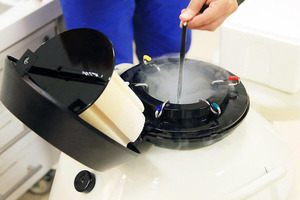Health Secretary welcomes reopening of fertility services
New guidance will allow clinics to reopen if they can prove measures to protect staff and patients are in place.

- fertility regulator to lift temporary suspension of fertility services
- Health and Social Care Secretary will ask all clinical commissioning groups to ensure local services urgently resume
People who had to put their fertility treatment on hold due to the COVID-19 outbreak will be able to continue their journey to start a family, following the fertility regulator’s decision to lift its suspension of all fertility services.
Fertility clinics across the UK can apply to reopen from Monday 11 May, the Human Fertilisation and Embryology Authority (HFEA) has confirmed, if they ensure the safety and protection of staff and patients.
The regulator has today set out new conditions for clinics, both private and NHS, to meet in response to the coronavirus outbreak.
All clinics will be required to set out a strategy to show they are meeting conditions to provide safe and effective treatment during the outbreak before they are given the green light to restart treatment.
Social distancing will be a requirement in waiting rooms and telephone appointments could be used where suitable. Appropriate personal protective equipment will also be provided where necessary.
Health and Social Care Secretary, Matt Hancock said:
Now that we are past the peak, I am delighted to announce the restoration of fertility services.
People who are relying on fertility treatment have been worried during these unprecedented times not knowing when they could continue their journey to start a family.
We wanted to open these clinics as soon as it was safe to do so, and our strict guidelines will ensure staff and patients remain safe as we continue to tackle this virus.
Sally Cheshire, Chair of the Human Fertilisation and Embryology Authority, said:
I am pleased that the HFEA has agreed fertility clinics can apply to reopen from 11 May. Our priority throughout the pandemic has been to consider how treatment could resume quickly and safely for as many patients as possible and our clear plan sets out how clinics can treat and care for patients safely during the continuing COVID-19 pandemic.
I know that the closure of clinics has been extremely distressing for patients and this will be good news for those wanting to resume treatment and have the opportunity to try for their much longed-for family.
Many private clinics may be able to demonstrate their readiness to restart services relatively quickly, but it’s recognised that NHS clinics may require longer to achieve the necessary conditions due to other factors, such as the redeployment of staff in frontline roles.
To ensure fair provision, the Health and Social Care Secretary will write to all clinical commissioning groups (CCGs) this week to confirm they are in a position to begin resuming fertility treatments to those in their area – either through a private clinic or an NHS service.
He will make clear that all fertility patients should be dealt with fairly and not face any additional disadvantage as a result of the service suspension.
Services were temporarily suspended on 23 March 2020 in response to the coronavirus lockdown, alongside other elective treatments by NHS England.
The new measures will mean individuals and couples looking to start fertility treatment will be able to safely continue to do so.
Clinics will be asked to provide strategic plans to the HFEA to ensure they are meeting the safety needs of patients before being given the go-ahead that they can reopen. An auditing tool will be used to ensure compliance with guidelines.
This follows news last week that the government will allow anyone who has frozen their eggs, sperm and embryos to extend their storage for an additional 2 years, as part of wider plans to support those going through fertility treatment during the global coronavirus pandemic.
Geeta Nargund, Lead Consultant for Reproductive Medicine at St George’s Hospital NHS Trust, said:
We are delighted that IVF services are opening soon. We thank the government for recognising the distress faced by thousands of women and couples across our nation and acting swiftly to help them.
We must ensure that effective social distancing and safety measures are put in place so that we can not only help save lives but start creating lives again.
Background information
CCGs are responsible for NHS fertility treatment provision in their area in England. Funding of IVF treatment is the responsibility of the devolved governments.
The National Institute for Health and Care Excellence (NICE) fertility guidelines makes recommendations about who should have access to IVF treatment on the NHS in England and Wales.
But individual NHS clinical commissioning groups (CCGs) make the final decision about who can have NHS-funded IVF in their local area, and their criteria may be different to those recommended by NICE.
Updates to this page
-
Removed the following line: 'NHS England and NHS Clinical Commissioners are drawing up guidance for CCGs to put in place a framework for resuming services'.
-
First published.